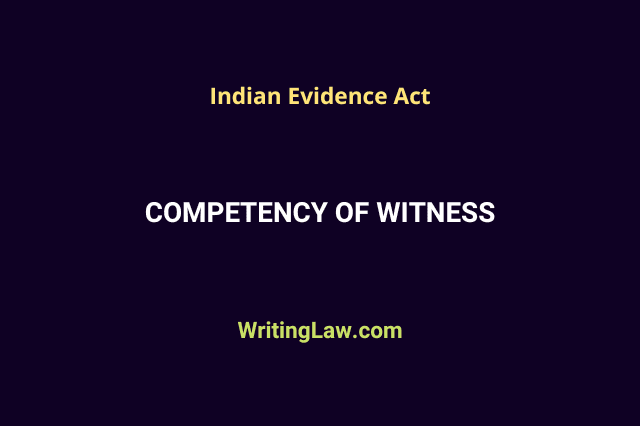
Generally, a person who has seen or knows the happening of the crime or offence is known as a witness. A witness is a person who testifies in court to support a claim of fact. A famous scholar, Bentham regarded the witnesses as eyes and ears of justice.
Generally, any person who can understand a fact with their senses qualifies as a witness. Section 118 of the Indian Evidence Act describes who may testify.
This law note helps you learn about the competency of the witnesses under the law of evidence in India.
Competency of Witnesses
The provision related to the competency of witnesses is provided under section 118 of the Indian Evidence Act. In the new Bharatiya Sakshya Adhiniyam of 2023, who may testify is mentioned under section 124 of Chapter IX.
Accordingly, everyone is qualified to testify unless the court determines that he cannot comprehend the questions posed to him or provide reasonable responses. The person may be unable to understand the question or to answer it due to the result of immaturity, extreme old age, physical or mental illness, or any other similar cause.
The Act does not declare anybody incompetent to appear as a witness. It is entirely at the judge’s discretion to determine whether thinness can comprehend the questions and give a fair answer.
Competency of Child Witness
A child can testify as a witness if the court is satisfied that the child is competent to comprehend the question posed before him and provides the court with reasonable responses. There is no specific legal age for testifying as a witness about understanding. A child, however, cannot affirm the statements made in an affidavit and is incompetent to swear to an affidavit.
Voir dire test: The court does this test to check a child’s competency. The court asks preliminary questions to the child not relating to the case to check whether the child can understand the question and give a rational answer, such as what your father’s name is, in which school you study, what subjects you read, and so on.
Competency of a Person of Unsound Mind
According to section 118 of the law of evidence, someone who has a mental illness is not necessarily incompetent until their illness limits them from understanding and responding to questions in a reasonable manner. Similarly, a lunatic is not qualified to testify until his insanity prevents him from comprehending the questions and reasonably responding to them.
Competency of Judges and Magistrates
A judge or magistrate is a competent witness who can testify on a crucial fact even if it occurred before him while serving as a judge or magistrate. However, a judge has a privilege concerning competency. According to section 121 of the Evidence Act, a judge cannot be questioned and forced to answer about his judicial actions or anything he observed in court. However, he is subject to examination on the matters that occurred in the court in his presence, and he witnessed them while acting as judge or magistrate.
Witness Unable to Communicate Verbally
According to section 119 of the Indian Evidence Act, a witness who cannot speak may provide his testimony in any other way that will allow it to be understood. It might be expressed by writing or hand gestures. However, such writing must be written and signed in an open court.
Further, if the witness cannot speak verbally, the court may use an interpreter or a special educator to help record the testimony. However, in that case, the statement must be videotaped.
- Understanding the Legislative Branch of the Indian Government - 6th May 2024
- Appointment, Oath, and Removal of Constitutional Posts in India - 28th April 2024
- Powers of Income Tax Authorities in India - 26th April 2024







